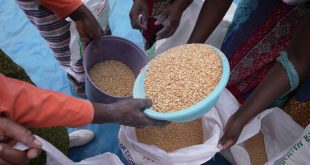ROME, Dec 07 (IPS) – Maximo Torero Cullen is the Chief Economist of the Food and Agriculture Organization (FAO)This year’s Human Rights Day marks the 74th year since the United Nations adopted the Universal Declaration of Human Rights, an international document that enshrines the rights and freedoms of all people. The right to food became a legal obligation for countries to promote and protect as part of the economic, social and cultural rights in 1966.
That fundamental right every one of us is entitled to — to be free from hunger — is at risk today like never before. Amid multiple global crises, such as climate change, pandemics, conflicts, growing inequalities and gender-based violence, more and more people are falling into the hunger trap.
As many as 828 million people faced hunger in 2021, an increase of 150 million more people since 2019, before the outbreak of the Covid-19 pandemic. Most recent projections indicate that more than 670 million people could still not have enough to eat in 2030.
It’s a far cry from the “zero hunger” target the world has ambitiously committed to less than a decade ago. It also shows just how deep inequalities run in societies across the world.
There is enough food to feed everyone in the world today. What is lacking is the capacity to buy food that is available because of high levels of poverty and inequalities. The war in Ukraine has made things worse. It shocked the global energy market, which has caused food prices to surge even more. This year alone saw an increase of $25 billion in food import bills of the world’s 62 most vulnerable countries, a 39% increase relative to 2020.
During the Covid-19 pandemic, a health crisis rapidly evolved into a food crisis, as the virus caused a shortage of farm workers and threatened to break down food supply chains. It taught us the importance of understanding the interlinked challenges of meeting growing food demand while protecting environmental, social and economic sustainability, as envisaged under the Sustainable Development Goals.
Eighty percent of the global poor live in rural areas and rely on farming to survive. Many of them — women, children, indigenous people and people with disability — don’t have access to food and are struggling with poor harvest, expensive seeds and fertilizers, and lack of financial services. They are directly affected by the risks and uncertainties facing our agrifood systems.
The gravity of the situation demands a holistic approach to tackle the hunger problem. We have to fix our broken agrifood systems to make them more inclusive, resilient and sustainable.
It means that we must take a human rights-based approach so as to apply human rights principles in our efforts. International frameworks provide legal and policy guidance to achieve universal, fundamental human rights.
The United Nations Committee on Economic, Social and Cultural Rights, for example, states that the right to food is indispensable for the fulfilment of other human rights. It emphasizes sustainability in that food must be accessible for both present and future generations. From availability, accessibility and healthy diets to food safety, consumer protection and the obligation of states to provide adequate food to their populations, it provides the foundation upon which to rebuild our agrifood systems.
Creating a coherent policy and legal framework around those core content will promote the right to food.
Since human rights are indivisible and interdependent, a human right cannot be enjoyed fully unless other human rights are also fulfilled. Advocating policies that promote other human rights — like health, education, water and sanitation, work and social protection — can positively impact the right to food as well.
Human Rights Day calls for dignity, freedom, and justice for all. Let us remember the critical role the right to food plays in achieving these important principles. And without these principles, we cannot reduce poverty or improve the well-being of all.
Food is fundamental to life. And it is key to strengthening our global efforts to find lasting solutions to today’s challenges.
© Inter Press Service (2022) — All Rights ReservedOriginal source: Inter Press Service
 Top Naija News: Nigerian News, Breaking News Nigeria and World News Top Naija News is a daily news publication in Nigeria, delivering the latest breaking news in Nigeria and around the world.
Top Naija News: Nigerian News, Breaking News Nigeria and World News Top Naija News is a daily news publication in Nigeria, delivering the latest breaking news in Nigeria and around the world.



